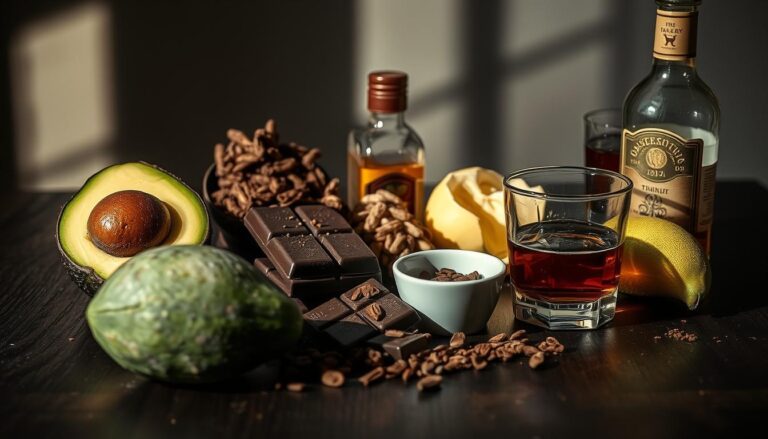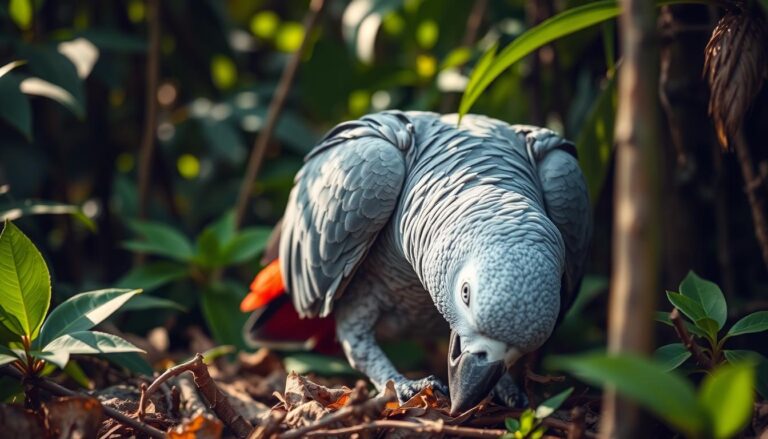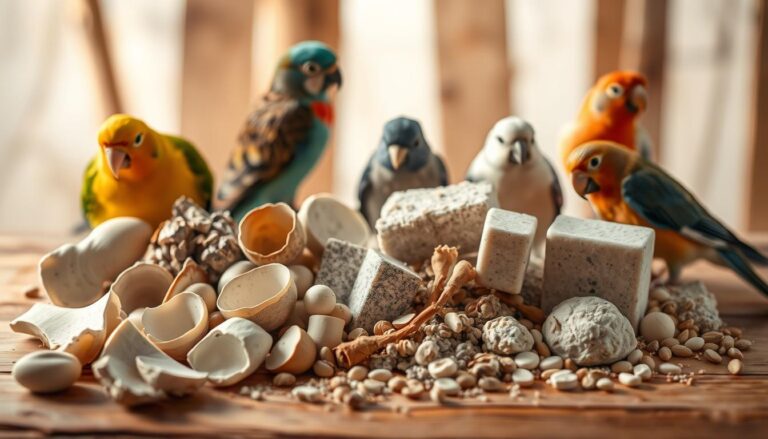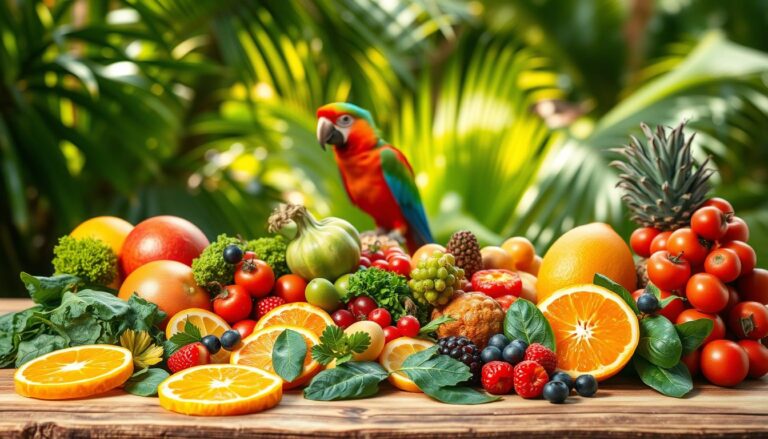African Grey Parrot Diet Plan: Safe Foods and Nutrition Guide”
Did you know that the right nutrition can help your parrot live up to 60 years? As a long-time owner of these intelligent birds, I’ve learned that their health and happiness depend heavily on what they eat. My experience with hand-fed, vaccinated parrots has taught me the importance of a balanced diet plan tailored to…
Did you know that the right nutrition can help your parrot live up to 60 years? As a long-time owner of these intelligent birds, I’ve learned that their health and happiness depend heavily on what they eat. My experience with hand-fed, vaccinated parrots has taught me the importance of a balanced diet plan tailored to their needs.

These birds are not just pets; they’re lifelong companions. With some parrots costing up to $900, like Zack, it’s essential to protect your investment. Proper nutrition not only enhances their lifespan but also supports their playful and talkative nature, as seen with Jackson, who’s house-trained and full of personality.
In this guide, I’ll share practical insights to help you avoid common mistakes that could lead to costly vet bills. Whether you’re new to owning a grey parrot or looking to refine their meals, this article will provide the tools you need to ensure they thrive.
Key Takeaways
- Proper nutrition can extend your parrot’s lifespan up to 60 years.
- Investing in a balanced diet protects your parrot’s health and your wallet.
- Gender-specific feeding approaches may be necessary for optimal care.
- Avoiding common dietary mistakes can prevent expensive vet visits.
- Healthy eating enhances your parrot’s behavior and overall well-being.
Understanding the African Grey Diet Plan
Understanding the nutritional needs of your parrot is key to their long-term health. These intelligent birds require a balanced meal plan tailored to their specific requirements. Whether you have a grey female or a male parrot, their dietary needs can vary significantly.
Why Nutrition Matters for African Greys
Proper nutrition is essential for maintaining your parrot’s health and vitality. For females, calcium is crucial, especially if they are laying eggs. Males, on the other hand, benefit from higher protein intake to support their active lifestyle. Hand-rearing practices, like those used for Zack, ensure that young birds receive the nutrients they need during critical developmental stages.
Feeding your parrot the wrong foods can lead to serious health issues. Avocado and chocolate, for example, are toxic and should never be given. Jackson’s tame behavior is a reminder that even small dietary mistakes can impact their well-being.
Common Dietary Mistakes to Avoid
One of the biggest mistakes is relying solely on seeds. While seeds are a part of their natural diet, they lack essential vitamins like vitamin A. This deficiency can lead to health problems, as highlighted in “Toys USA” listings. Additionally, zinc toxicity from cage materials can harm even vaccinated birds, so it’s important to choose safe materials.
Whether your parrot costs $900 or $2,000, their dietary needs remain the same. Investing in a balanced meal plan not only protects their health but also enhances their quality of life. By avoiding these common mistakes, you can ensure your parrot thrives for years to come.
Safe Foods for Your African Grey Parrot
Feeding your parrot the right foods can make a world of difference in their health and happiness. Whether you have a grey female parrot or an african grey male, their nutritional needs are unique. Let’s explore the best options to keep them thriving.

Fresh Fruits Your Parrot Will Love
Fruits are a great way to add variety and essential nutrients to your parrot’s meals. Papaya, for example, is excellent for enhancing the plumage of a grey male. Mangoes are another favorite, but always remove the pit before serving.
Jackson, my one-and-a-half-year-old parrot, loves mango chunks. Preparing them in small, bite-sized pieces keeps him engaged and happy. Remember to avoid apple seeds, as they contain harmful compounds.
Vegetables That Boost Health
Vegetables are packed with vitamins and minerals that support your parrot’s overall health. Sweet potatoes are particularly beneficial for grey female parrots, especially during egg production. They’re rich in beta-carotene, which promotes strong eggshells.
Other great options include carrots and leafy greens. Sprouting techniques can also enhance the nutritional value of vegetables, making them even more beneficial for your feathered friend.
Nuts and Seeds: The Good and the Bad
Nuts and seeds are a natural part of a parrot’s diet, but moderation is key. Almonds are a safer choice compared to peanuts, which can sometimes carry mold. Pumpkin seeds are another excellent option, but be mindful of their zinc content.
Zack, my weaned parrot, enjoys a mix of nuts and seeds as a treat. Always ensure they’re unsalted and free from additives to keep your parrot healthy and happy.
Creating a Balanced Feeding Routine
Establishing a consistent feeding routine is vital for your parrot’s well-being. It ensures they receive the right nutrients at the right times, keeping them healthy and active. Whether you have a grey male parrot or an african grey female, their needs vary based on age, gender, and activity level.

How Often Should You Feed Your Parrot?
Meal frequency depends on your parrot’s age. For example, Jackson, my 1.5-year-old parrot, eats three times a day. Adult parrots like Zack, however, thrive on two meals daily. Adjusting their schedule ensures they get enough energy without overeating.
Portion Sizes for Male and Female Parrots
Portion sizes should reflect your parrot’s gender. A female parrot may need extra calcium, especially during egg production. Males, on the other hand, benefit from slightly larger portions to support their active lifestyle. Always monitor their weight to avoid overfeeding.
- Integrate foraging strategies to keep meals engaging.
- Schedule calcium supplements for nesting box preparations.
- Adjust portions based on vocalizations indicating hunger.
- Time meals with talking training sessions for better results.
By tailoring their feeding routine, you’ll ensure your parrot stays healthy, happy, and full of energy. Small adjustments can make a big difference in their overall well-being.
Keeping Your African Grey Healthy and Happy
Keeping your parrot healthy and happy goes beyond just food—it’s about creating a nurturing environment. Bonding through shared meals can strengthen your connection, especially with house-trained companions like Zack and Jackson. Their talking ability thrives when they feel secure and engaged.
Mental stimulation is key. Toys from Toys Canada can keep them entertained during meals, while foraging strategies encourage natural behaviors. Regular vet checkups ensure their vaccination status is up-to-date, preventing health issues.
Don’t forget their physical needs. Wing clipping, if done safely, can manage their flight energy. Bathing routines enhance their grey beautiful plumage, keeping them vibrant and healthy. Monitor their droppings to ensure they meet care guide standards.
By focusing on these aspects, you’ll create a balanced lifestyle that keeps your parrot thriving for years to come.
FAQ
Why is nutrition important for my grey parrot?
Proper nutrition ensures your grey parrot stays healthy, energetic, and mentally sharp. A balanced diet supports their immune system and prevents common health issues.
What are some common mistakes in feeding my grey parrot?
Overfeeding seeds, offering too many fatty nuts, or neglecting fresh fruits and veggies are common errors. These can lead to obesity and nutrient deficiencies.
What fresh fruits can I safely give my grey parrot?
Apples, bananas, berries, and melons are great choices. Always remove seeds and pits to avoid any risk of toxicity.
Which vegetables are best for my grey parrot’s health?
Leafy greens like kale and spinach, along with carrots, broccoli, and bell peppers, are excellent options. They provide essential vitamins and minerals.
Are nuts and seeds safe for my grey parrot?
Yes, but in moderation. Almonds, walnuts, and sunflower seeds are good treats, but too many can lead to weight gain. Always offer unsalted varieties.
How often should I feed my grey parrot?
Twice a day is ideal. Offer fresh food in the morning and evening, ensuring a mix of fruits, veggies, and pellets for variety.
How do I determine portion sizes for my grey parrot?
Portions depend on size and activity level. A general rule is to provide about 1/4 to 1/2 cup of food per meal, adjusting as needed.
How can I keep my grey parrot healthy and happy?
Combine a balanced diet with regular mental stimulation, exercise, and social interaction. Routine vet check-ups also play a key role in their well-being.




